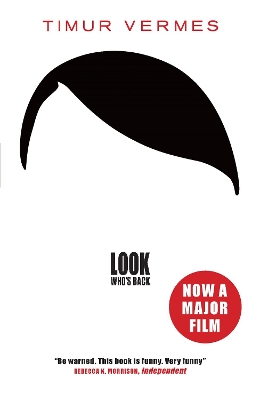
Michael @ Knowledge Lost
Er ist wieder da (English title Look Who’s Back) is Timur Vermes first novel after working as a ghostwriter. The book is a biting satire of what might happen if Adolf Hitler was alive in the 21st Century. Of course, if he we was alive today he would be on television, spitting his ideology to the influential masses. While many thought of him as a method actor and a comedian, the novel centres on a return to power and politics with his lack of political correctness.
Interestingly enough Look Who’s Back plays on the ideas around satire; while most people within the novel believe Adolf Hitler is just a satirist, the whole notion is that there is a fine line between satire and venomous ideology. One thing I found particularly interesting within the novel is the way Timur Vermes plays with the idea that satire is meant to be funny and I want to stop and give these people a lesson on the differences between Horatian and Juvenalian satire. There are a lot of comedic values within Look Who’s Back (Horatian satire) however the satire within the novel was Juvenalian.
The way Hitler was portrayed within the book, kept reminding me of Bruno Ganz’s performance in Downfall for some weird reason. While Vermes put a lot of effort and thought into how Hitler would react to a modern Germany, this book soon became a one trick pony. The different scenarios Hitler found himself in started off as humorous but soon the jokes got a little old. Despite this fact, I have to be impressed with the amount of thought that went into the ideas Hitler would have towards Germany today.
I do however suspect there is something lost on a reader who doesn’t live within Germany. While there is a lot of entertainment to be had with the novel the subject matter wouldn’t have the same effect. The fact remains that Adolf Hitler was very damaging to Germany and the subject matter would remain a controversial topic. While Timur Vermes depicted Hitler as a man (rather than a monster) in an effort to examine how National Socialism rose to power, Germany remains wary of the effects of this ideology. Hitler’s ideas towards Judaism and immigration have left a bad taste in the mouth of every German person and the results have led to an overly politically correct society. The damage is still visible, but despite the controversial nature of Look Who’s Back, the book sold over 1.4 million copies within Germany and has been translated into twenty eight languages (Jamie Bulloch being the English translator).
I found myself getting a little bored by the jokes within this novel and the moral message was easily recognisable half way through. While there is plenty of interesting ideas within Look Who’s Back, I believe this book might have been more enjoyable if it was cut down about half its size. Hitler comes across as an uncompromising, charismatic but deeply flawed human and while this is needed for this story, it is hard not to see him as anything but a monster.
This review originally appeared on my blog: http://literary-exploration.com/2014/11/20/look-whos-back-by-timur-vermes/
